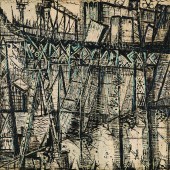Effat Naghi
Egypt 1905-1994
Effat Nagy’s work is inspired by Egyptian archaeological and folk artefacts, which often appear in her assemblages and mixed media pieces. Integrating a variety of materials such as crocodile skins, antique painted wood, and magic amulets, Nagy produces densely textured and colourful pieces that speak to a primitivist aesthetic rooted in 1920s Egypt. It was during this time that Nagy’s brother, artist Mohamed Nagy called for a national embrace of Egypt’s folkloric heritage. Nagy’s husband, Saad el-Khadem, was also an artist and researcher of popular myths and visual expressions and Nagy’s work is often considered along with that of her brother and husband as sharing an aspiration towards the creation of a contemporary art that embraced and honoured the magical legends central to folklore.
In 1964, Nagy was chosen, along with a select number of artists, by the Egyptian Ministry of Culture to visit the building of the Aswan Dam, a project undertaken by the government in the decade following the 1952 Egyptian Revolution. The consequences of the project—the flooding and forced relocation of villages in Lower Nubia to Sudan, for instance, as well as labour conditions on site—can be read within a number of works produced during the period by Egyptian artists, including Nagy. Her 1966 piece, The High Dam, records a dark labyrinth of scaffolding that slices across the surface of the canvas, suggesting less a glorified achievement of modern industrialisation and more of a looming medieval fortress.
Born in Alexandria to an aristocratic family, Nagy began her artistic training in her youth with a private tutor. In 1947, she began several years of study in Rome’s Accademia di Belle Arti. In 2001, an eponymous museum dedicated to the work of Nagy and her husband opened in Cairo.
Related artists by country
- Ahmed Askalany
- Adam Henein
- Chant Avedissian
- Fathi Afifi
- Fathi Hassan
- George Bahgory
- Ghada Amer
- Huda Lutfi
- Khaled Hafez
- Lara Baladi
- Abdel Hadi El Gazzar
- Ahmed Moustafa
- Raafat Ishak
- Susan Hefuna
- Youssef Nabil
- Gazbia Sirry
- Ragheb Ayad
- Seif Wanly
- Samir Rafi
- Omar El Nagdi
- Hamed Nada
- Kamel Moustafa
- Kareem Lotfy
- Mahmoud Said
- Mohammed Naghi
- Nermine Hammam
- Youssef Kamel
- Hazem Mahdy
- Ayad Al Nimar
- Mohammed Ismail
- Adel El Siwi
- Adham Wanly
- Guirguis Lotfy
- Hussein Bicar
- Inji Efflatoun
- Kamel El Telmesani
- Khaled Zaki
- Moataz Nasr
- Reda Abdelrahman
- Shaaban Zaki
- Farghali Abdel Hafiz
- Mohammed Sabry
- Wael Darwish
- Ahmed Kassem
- Marwa Adel
- Ammar Abo Bakr
- Basim Magdy
- Ganzeer
- Iman Issa
- Mohamed Abou El Naga
- Clea Badaro
- Farida El Gazzar
- Hamed Ewais
- Maha Maamoun
- Marguerite Nakhla
- Ramses Younan
- Salah Abdel Kerim
- Yasser Rostom
- Amr Nazeer
- Aya Tarek
- George Hanna Sabbagh
- Nadim Raef
- Tahia Halim
- Hussein Fawzi
- Ahmed Morsi
- Walid Ebeid
- Ezequiel Baroukh
- Saad El Khadem
- Van Leo
- Mamdouh Ammar
- Salah Taher
- Zeinab Abd El Hamid
- Armen Agop
- Wassef Boutros-Ghali
- Menhat Helmy
- Mariam Abdel-Aleem
- Hamed Abdalla
- Alaa Awad
- Ehsan Mokthar
- Fatma Arargi
- Salam Yousry
- Anna Boghighuian
- Gamal El Sagini
- Leila Izzat
- Mahmoud Afifi
- Nadia Mohammed
- Rebab Nemr
- Khadiga Riad
- Abdel Badie Abdel Hay
- Mahrous Abdou
- Mohamed Abla
- Nazek Hamdy
- Atyat El Ahwal
- Nitokriss
- Fahima Amin
- Kawkab Youssef Al Assal
- Etimad El Taraboulsy
- Naeema El Shishini
- Kadria Hussein
- Aida Marini
- Mohamed Elbehairy
- Ezzat Ibrahim
- Ihsan Khalil
- Salam El-Alak
- Zainab Abdo
- Maggy Axisa
